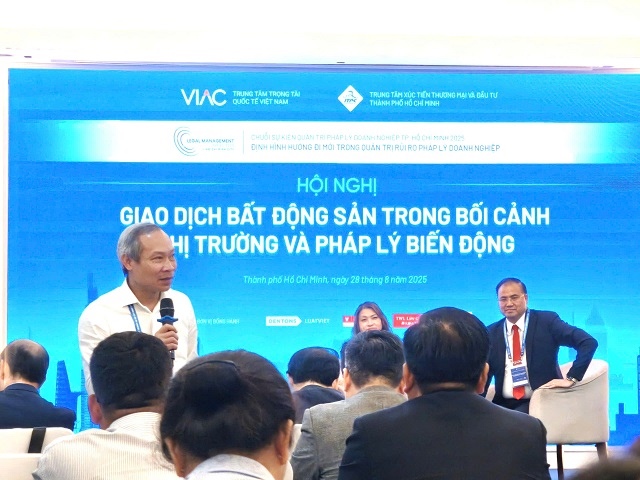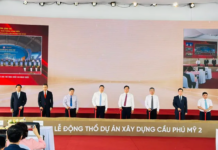
Dr. Phan Duc Hieu speaking at the Conference. Photo: Thuong Ngoc
|
New Highlights from Resolution 198
Speaking at the Conference on Real Estate Transactions in the Context of Market and Legal Changes on August 28, Mr. Hieu remarked that Resolution 198/2025/QH15 has institutionalized many contents from Resolution 68-NQ/TW on private economic development. Among them, three notable points stand out.
Firstly, there is a focus on not criminalizing civil and economic relations. Resolution 198 emphasizes the role of proactive remediation in handling violations. This is no longer just a mitigating or aggravating factor as before, but has become an important basis for considering responsibility, reflecting a shift in legislative thinking.
Secondly, procurement and construction packages worth less than 20 billion will be exclusively reserved for small and medium-sized enterprises. This promotes a more balanced business ecosystem and prevents businesses that are too large or too small from facing challenges in accessing opportunities.
Thirdly, industrial parks in provinces must allocate 5% of their land funds for lease to small and medium-sized enterprises, and localities will support at least 30% of the rent for 5 years. This significant change enables small and medium-sized enterprises to access production infrastructure more easily, something they often faced obstacles in due to their small investment scale.
Notable Points from the 2025 Investment Law
Mr. Hieu assessed that a prominent point of the 2025 Investment Law is its strong decentralization. Previously, projects worth 10 trillion VND had to be decided by the National Assembly, but now the National Assembly will only decide on projects worth more than 30 trillion VND. Localities have the authority to decide on projects up to 10 trillion VND.
The thinking behind the Public-Private Partnership (PPP) law has also evolved. The previous law limited PPP to five specific fields, but now there are no industry restrictions, demonstrating a more open approach to mobilizing private resources.
Additionally, the Law Amending and Supplementing a Number of Articles of the Law on Credit Institutions was mentioned, particularly the provision allowing banks to seize secured assets. According to Mr. Hieu, this is an emergency measure to protect assets in the context of limitations in the information system about secured assets.
A notable point from the Resolution on social housing is the establishment of a National Housing Fund, which can take the form of a financial fund or a housing development fund. Furthermore, the process of selecting investors for social housing projects will be simplified, eliminating the need for bidding and auctioning as before. The development of housing in industrial parks will also be adjusted for more flexibility to match practical demands.
Four Key Issues in Amending the Planning Law
According to Mr. Hieu, there are four important issues regarding the Law on Planning Management (amended) that need to be discussed in the upcoming National Assembly session.
Firstly, there is the issue of land use planning. It needs to be clarified at which level the land use plan will be formulated – commune, district, or provincial – and what content needs to be managed. Many opinions suggest shifting from managing rigid allocation indicators to managing ratios to match the local socio-economic development trend.
Secondly, the mechanism for land recovery needs to be addressed. Currently, enterprises still have to negotiate with residents when implementing projects. However, for large-scale projects, reaching a 100% agreement is challenging. Therefore, it is necessary to establish clear criteria for when the state can intervene to provide support while ensuring transparency and objectivity.
Thirdly, the form of land rent payment should be flexible. Currently, there are six cases where land can be rented with a one-time payment, and the rest are annual payments. Investors who opt for a one-time payment can choose to switch to annual payments, but not vice versa. This mechanism needs to be reconsidered to allow for more flexibility.
The fourth issue pertains to land valuation and market principles. There are currently four methods for determining land prices, but there are still many debates about whether these methods truly reflect market principles.
In relation to the option of paying land rent annually or at once, a concern arises from the 2023 Land Law, which limits the cases of paying at once to maintain stable budget revenue and stable costs for enterprises. However, many projects cannot switch from annual to one-time payments to mortgage when borrowing from banks. With the Resolutions on the development of international financial centers, if the restrictions on land-use right payments are not lifted, enterprises may face difficulties in mortgaging land-use rights to borrow from foreign organizations.
Regarding this perspective, Mr. Hieu stated that, in reality, no option is equally beneficial to all parties. Many enterprises prefer to lease land and pay annually so that they can invest the remaining money in other ventures. If the project is unsuccessful after 2-3 years, they can opt out. In his personal opinion, Mr. Hieu suggested that instead of leasing land and paying a one-time fee, enterprises should pay annually and use the surplus money to develop products on that land, such as factories or other structures, or create other assets. Furthermore, separating projects by their land rent payment methods can be a way to screen and categorize investors.
Suggestions for Amending the Investment Law
Finally, Mr. Hieu suggested that the Investment Law also needs to be amended in several aspects, including streamlining and simplifying investment and business procedures, further enhancing the decentralization of authority for approving investment proposals, refining regulations on conditional investment and business lines, and improving regulations on industries, locations, and special investment and support policies. Additionally, managing outbound investment activities should align with the state’s management objectives and the investors’ freedom of doing business. Lastly, it is crucial to refine the regulations on implementing investment projects and address practical difficulties and bottlenecks related to project implementation.
– 16:36 08/29/2025
A Proposal to Reduce Land Use Fees for Residential Purposes
HoREA has proposed that in the event of a Government Resolution, the collection of land use fees when converting agricultural or non-agricultural land to residential land should be clearly specified. They suggest a reduction from 30% to 20% for land within the allocated residential land limit, and from 50% to 30% for land exceeding this limit.
The New Property Market: Navigating the Billion-Dollar Shockwaves.
The Vietnam Valuation Association emphasizes the need for consistency in the government’s land pricing policy, adhering to market mechanisms. To mitigate any adverse impacts on the populace, the Association proposes the implementation of supplementary financial policies and reasonable incentives.
Dr. Vu Dinh Anh: Land Valuation Must Follow Market Mechanisms
“The notion of ‘land valuation close to market price’ is problematic, according to Dr. Vu Dinh Anh. He argues that adhering to this perspective will never fundamentally resolve the issue. Instead, he proposes embracing the principle of ‘land valuation adhering to market mechanisms’ and emphasizes the imperative of establishing an impartial, transparent, and professional land valuation market.”




















